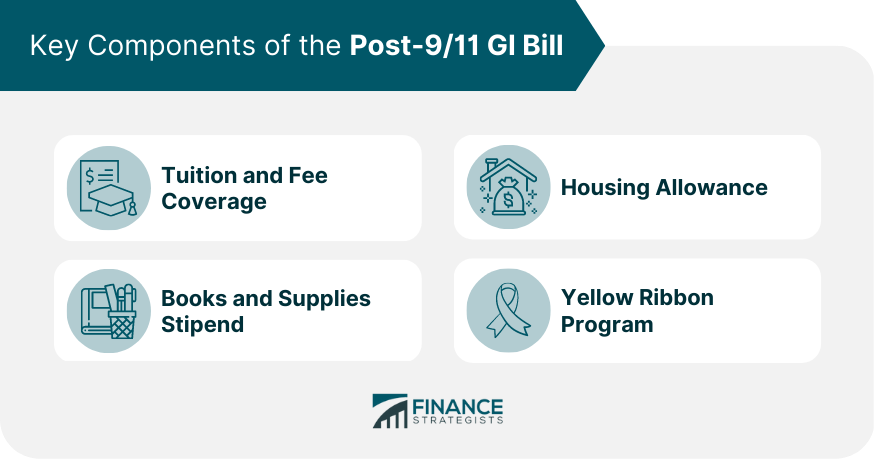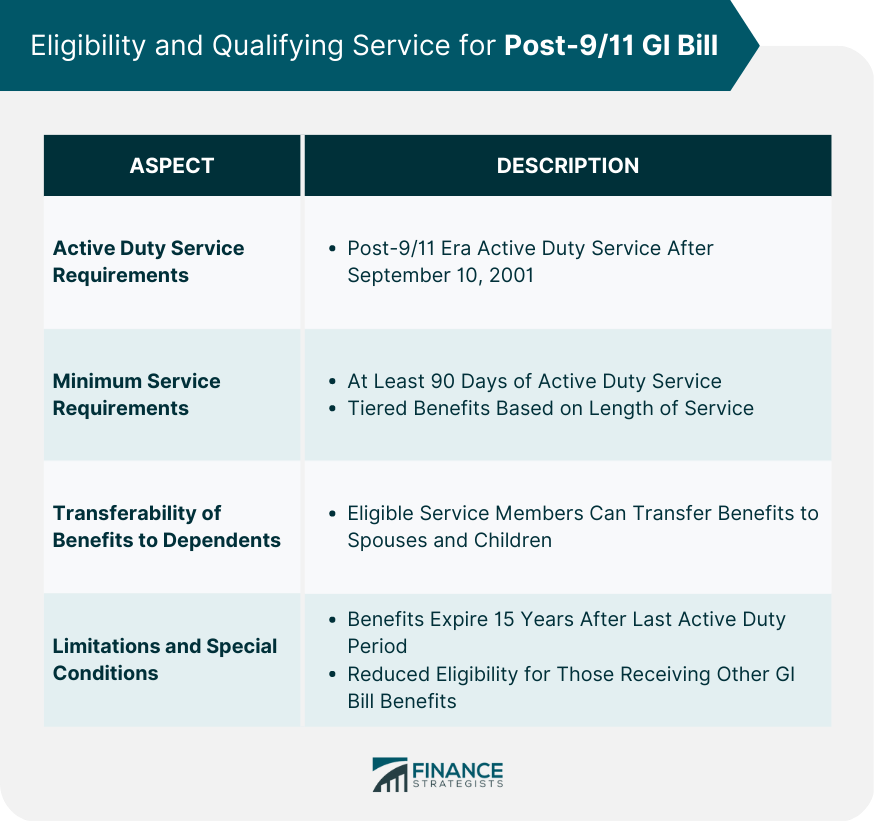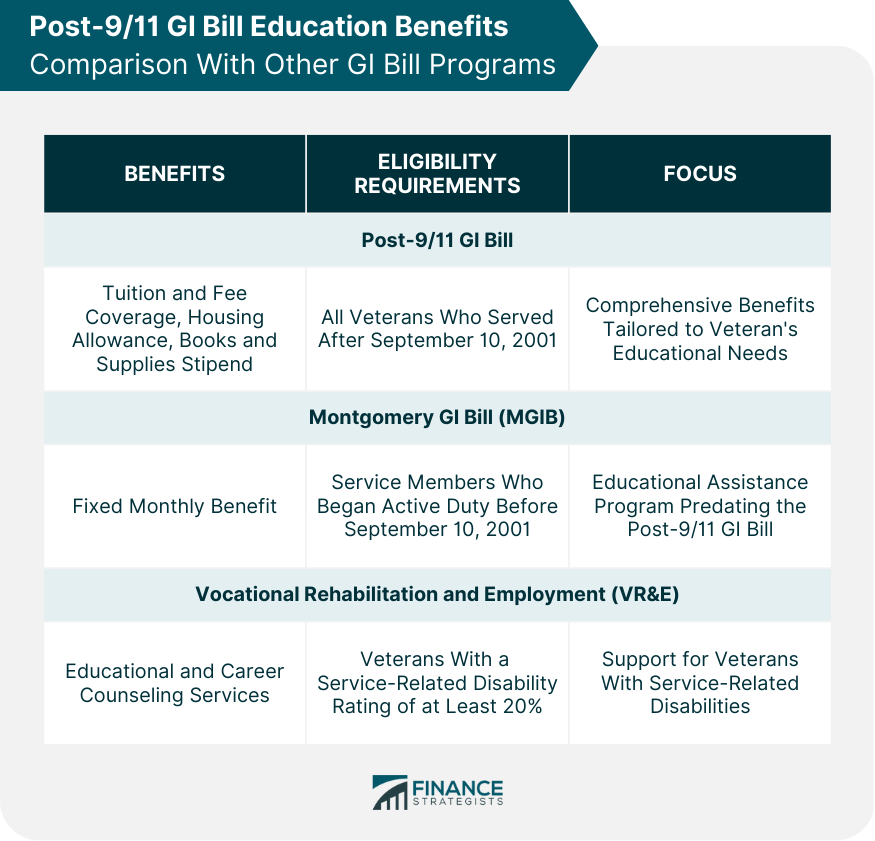The Post-9/11 GI Bill was introduced to provide educational benefits for veterans. It was established in 2008 as a response to the 9/11 terrorist attacks, with the aim to help veterans transition from military service to civilian life. The bill provides financial support for education and training, making higher education more accessible for eligible service members. The purpose of the Post-9/11 GI Bill education benefits is to aid veterans in obtaining higher education and improving career opportunities. The bill's benefits enable veterans to access quality education, which can lead to better employment prospects, increased earning potential, and improved quality of life. Eligibility criteria for the Post-9/11 GI Bill benefits include active duty service requirements and minimum service length. Service members must have served at least 90 days on active duty after September 10, 2001, to be eligible for benefits. The level of benefits received depends on the duration of service. The Post-9/11 GI Bill covers tuition and fees for eligible veterans pursuing higher education. It provides financial assistance for various types of educational institutions, including public, private, and foreign schools. For public schools, the bill covers 100% of in-state tuition and fees for eligible veterans. This coverage ensures that veterans can attend public institutions in their state without incurring substantial debt. The Post-9/11 GI Bill offers capped tuition and fee coverage for private and foreign schools. The cap is adjusted annually and helps veterans afford an education at private and foreign institutions, although it may not cover the full cost of attendance. The Post-9/11 GI Bill includes a monthly housing allowance for eligible veterans. This allowance helps veterans cover their living expenses while pursuing education. The housing allowance is calculated based on the military's Basic Allowance for Housing (BAH) rates for an E-5 with dependents. Factors such as the school's location and the veteran's enrollment status influence the allowance amount. Veterans enrolled in online learning programs receive a reduced housing allowance. This adjustment recognizes the differences in living expenses for online students compared to those attending in-person classes. The Post-9/11 GI Bill offers an annual books and supplies stipend for eligible veterans. This stipend helps veterans cover the costs of textbooks and other necessary educational materials. The Yellow Ribbon Program is a voluntary partnership between the VA and participating institutions. It provides additional financial assistance to eligible veterans attending participating schools with tuition costs exceeding the Post-9/11 GI Bill's coverage limits. Colleges and universities that participate in the Yellow Ribbon Program agree to contribute a specific amount toward a veteran's tuition and fees. The VA matches the institution's contribution, effectively reducing or eliminating the tuition gap. The additional tuition assistance provided through the Yellow Ribbon Program helps veterans attend more expensive educational institutions. This support increases the range of educational options available to veterans. To be eligible for the Post-9/11 GI Bill benefits, service members must have served on active duty after September 10, 2001. The active duty service requirement ensures that the benefits are accessible to veterans who have served during the post-9/11 era. To qualify for Post-9/11 GI Bill benefits, service members must have served a minimum of 90 days on active duty. The level of benefits received is tiered based on the duration of service, with increased benefits for those who have served longer periods. The Post-9/11 GI Bill allows eligible service members to transfer their education benefits to their dependents, including spouses and children. This transferability feature helps families of veterans access higher education and enhance their career prospects. Certain limitations and special conditions apply to the Post-9/11 GI Bill benefits. For example, benefits expire 15 years after the service member's last period of active duty, and individuals who receive benefits under other GI Bill programs may have reduced eligibility for Post-9/11 GI Bill benefits. Before applying for Post-9/11 GI Bill benefits, veterans must gather necessary documentation, such as their discharge or separation papers (DD Form 214) and personal identification. These documents are essential for verifying eligibility and ensuring a smooth application process. Veterans can apply for Post-9/11 GI Bill benefits through the VA's online application system (VONAPP). The online application process streamlines submissions and allows veterans to track the status of their applications. After submitting an application, veterans receive a Certificate of Eligibility from the VA. The COE confirms eligibility for Post-9/11 GI Bill benefits and outlines the specific benefits available to the veteran. Veterans must communicate with their school's certifying official to coordinate the use of their Post-9/11 GI Bill benefits. The certifying official verifies the veteran's enrollment and submits necessary documentation to the VA to ensure that benefits are accurately applied to the veteran's account. The Montgomery GI Bill is another educational assistance program for veterans predating the Post-9/11 GI Bill. It offers different benefits and eligibility requirements, making it essential for veterans to compare both programs before selecting the best option for their needs. The MGIB provides a fixed monthly benefit for eligible veterans, while the Post-9/11 GI Bill offers tuition and fee coverage, a housing allowance, and a books and supplies stipend. The Post-9/11 GI Bill benefits are generally more comprehensive and tailored to the veteran's specific educational needs. The eligibility requirements for the MGIB differ from those of the Post-9/11 GI Bill, with the MGIB focusing on service members who began active duty before September 10, 2001. Veterans should review the specific eligibility requirements for both programs to determine which best aligns with their service history and educational goals. The Vocational Rehabilitation and Employment program offers support to veterans with service-related disabilities. This program differs from the Post-9/11 GI Bill in its focus on disability requirements and the types of services provided. To be eligible for the VR&E program, veterans must have a service-related disability rating of at least 20%. This requirement distinguishes the VR&E program from the Post-9/11 GI Bill, which does not have a disability requirement. The VR&E program provides educational and career counseling services to help veterans with disabilities achieve their employment goals. These services complement the financial assistance the Post-9/11 GI Bill offers and can be invaluable for veterans seeking guidance and support in their educational and career pursuits. Veterans should explore additional financial aid options to supplement their Post-9/11 GI Bill benefits. Scholarships, grants, and work-study programs can help veterans further reduce their out-of-pocket expenses and minimize debt. Veterans should utilize resources specifically designed for them, such as veteran service organizations and campus veterans centers. These resources can provide valuable information, support, and networking opportunities to help veterans make the most of their Post-9/11 GI Bill benefits. Proper educational and career planning is crucial for maximizing the value of Post-9/11 GI Bill benefits. Veterans should research potential careers, identify in-demand skills, and choose educational programs that align with their long-term goals. Effective time management strategies can help veterans balance their academic, professional, and personal responsibilities while using their Post-9/11 GI Bill benefits. Developing a structured schedule and setting realistic goals can lead to greater academic success and a smoother transition to civilian life. The Post-9/11 GI Bill has faced administrative challenges that have sometimes delayed benefit disbursement and hindered veterans' educational progress. Veterans and advocates should remain vigilant and work together to address these issues and ensure timely access to benefits. Over time, the Post-9/11 GI Bill has undergone legislative changes and updates to better serve the needs of veterans. Continued advocacy and support for such improvements can help ensure the program remains effective and responsive to the evolving needs of veterans. Veterans, educators, and policymakers should continue advocating for improvements to the Post-9/11 GI Bill. This advocacy can help identify areas for growth and development, ensuring the program remains a valuable resource for veterans and their families. The Post-9/11 GI Bill plays a vital role in supporting veterans as they transition to civilian life. By providing comprehensive educational benefits, the program helps veterans gain the skills and credentials needed for successful careers. The Post-9/11 GI Bill has significantly impacted veteran education and career opportunities by making higher education more accessible and affordable. This increased access to education translates to better employment prospects, higher earning potential, and improved quality of life for veterans and their families. It is essential to maintain a continued commitment to supporting veterans through the Post-9/11 GI Bill and other resources. By investing in veterans' education and career development, society benefits from the skills, experience, and leadership that veterans bring to the workforce. Veterans should consider seeking the guidance of a financial advisor to help them navigate the complexities of the Post-9/11 GI Bill and other financial aid options.What Are Post-9/11 GI Bill Education Benefits?
Key Components of the Post-9/11 GI Bill

Tuition and Fee Coverage
In-State Tuition Rates
Private and Foreign School Tuition Limits
Housing Allowance
Calculation of Allowance
Online Learning Adjustments
Books and Supplies Stipend
Yellow Ribbon Program
Participating Institutions
Additional Tuition Assistance
Eligibility and Qualifying Service for Post-9/11 GI Bill
Active Duty Service Requirements
Minimum Service Requirements
Transferability of Benefits to Dependents
Limitations and Special Conditions

Application Process for Post-9/11 GI Bill Education Benefits
Gathering Necessary Documentation
Online Application Through VA Website
Certificate of Eligibility (COE)
Communicating with School's Certifying Official
Post-9/11 GI Bill Education Benefits Comparison with Other GI Bill Programs
Montgomery GI Bill (MGIB)
Benefit Differences
Eligibility Differences
Vocational Rehabilitation and Employment (VR&E)
Service-Related Disability Requirements
Educational and Career Counseling

Maximizing Post-9/11 GI Bill Benefits
Exploring Additional Financial Aid Options
Utilizing Resources for Veterans
Educational and Career Planning
Time Management Strategies
Post-9/11 GI Bill Challenges and Improvements
Overcoming Administrative Issues
Legislative Changes and Updates
Advocacy for Continued Improvement
Final Thoughts
Post-9/11 GI Bill Education Benefits FAQs
The main components of the Post-9/11 GI Bill education benefits include tuition and fee coverage, a monthly housing allowance, an annual books and supplies stipend, and access to the Yellow Ribbon Program for additional tuition assistance at participating institutions.
The Post-9/11 GI Bill education benefits are generally more comprehensive than the MGIB, offering tuition and fee coverage, housing allowance, and a books and supplies stipend. The MGIB provides a fixed monthly benefit, and eligibility requirements also differ between the two programs.
Veterans can maximize their Post-9/11 GI Bill education benefits by exploring additional financial aid options, utilizing resources for veterans, engaging in educational and career planning, and implementing effective time management strategies.
Challenges associated with the Post-9/11 GI Bill education benefits include overcoming administrative issues and keeping up with legislative changes and updates. Improvements can be achieved through continued advocacy for the program and addressing these challenges to better serve veterans.
Post-9/11 GI Bill education benefits support veterans' education and career opportunities by making higher education more accessible and affordable. This increased access leads to better employment prospects, higher earning potential, and improved quality of life for veterans and their families.
True Tamplin is a published author, public speaker, CEO of UpDigital, and founder of Finance Strategists.
True is a Certified Educator in Personal Finance (CEPF®), author of The Handy Financial Ratios Guide, a member of the Society for Advancing Business Editing and Writing, contributes to his financial education site, Finance Strategists, and has spoken to various financial communities such as the CFA Institute, as well as university students like his Alma mater, Biola University, where he received a bachelor of science in business and data analytics.
To learn more about True, visit his personal website or view his author profiles on Amazon, Nasdaq and Forbes.











